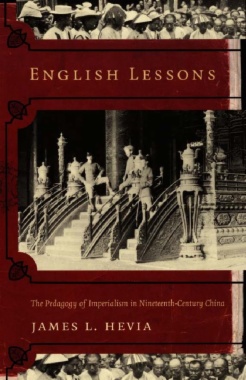Inserting China into the history of nineteenth-century colonialism,
English Lessons explores the ways that Euroamerican imperial powers humiliated the Qing monarchy and disciplined the Qing polity in the wake of multipower invasions of China in 1860 and 1900. Focusing on the processes by which Great Britain enacted a pedagogical project that was itself a form of colonization, James L. Hevia demonstrates how British actors instructed the Manchu-Chinese elite on “proper” behavior in a world dominated by multiple imperial powers. Their aim was to “bring China low” and make it a willing participant in British strategic goals in Asia. These lessons not only transformed the Qing dynasty but ultimately contributed to its destruction.
Hevia analyzes British Foreign Office documents, diplomatic memoirs, auction house and museum records, nineteenth-century scholarly analyses of Chinese history and culture, campaign records, and photographs. He shows how Britain refigured its imperial project in
China as a cultural endeavor through examinations of the circulation of military loot in Europe, the creation of an art history of “things Chinese,” the construction of a field of knowledge about China, and the Great Game rivalry between Britain, Russia, and the Qing empire in Central Asia. In so doing, he illuminates the impact of these elements on the colonial project and the creation of a national consciousness in China.

